My Life in Japan, Living and Working in Japanese (1)
Transcending Different Languages and Cultures to Deliver Real, Unfiltered Emotions
Amandine talks about the charm of Japan and the future of international exchanges
Interview with Amandine and Gentoku of BonSoirTV
October 30, 2024
【Special Feature 082】
Special Feature: My Life in Japan, Living and Working in Japanese― (for summary on special features, click here)
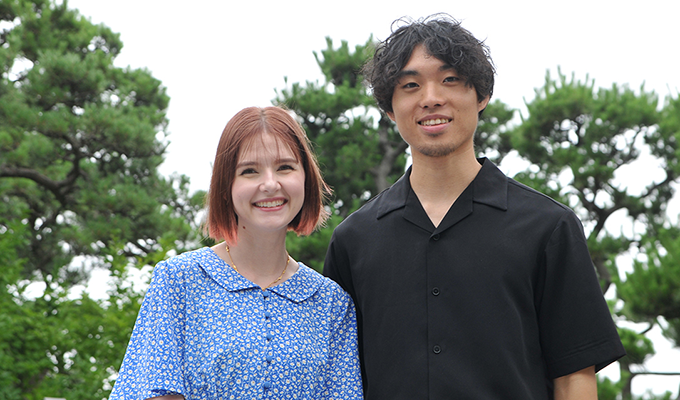
Amandine (French) and Gentoku (Japanese) are an international married couple and YouTubers. Based in Sakata, Yamagata Prefecture, the two reveal the charms of Japan to the world on their YouTube channel, "BonSoirTV." Many of their videos have over one million views and as of September 2024, they have 650,000 subscribers, and that number is continuing to grow.
Amandine, originally from France, has now been in Japan for over five years. Her excellent Japanese communication skills, profound understanding of Japanese culture, and nuanced powers of expression have gained her a wide following that shows tremendous support. This special feature, entitled "My Life in Japan, Living and Working in Japanese," focuses on foreigners working in Japan, and the challenges they face using Japanese in their work and daily lives. In this edition, we ask Amandine, who was born and raised in France, how she first encountered Japanese and then became proficient, how she utilizes the language in her daily life and current activities, and the motivations behind why she and her husband Gentoku continue to make videos.
The Long Path to Japan Began from the Moment Amandine Was Born
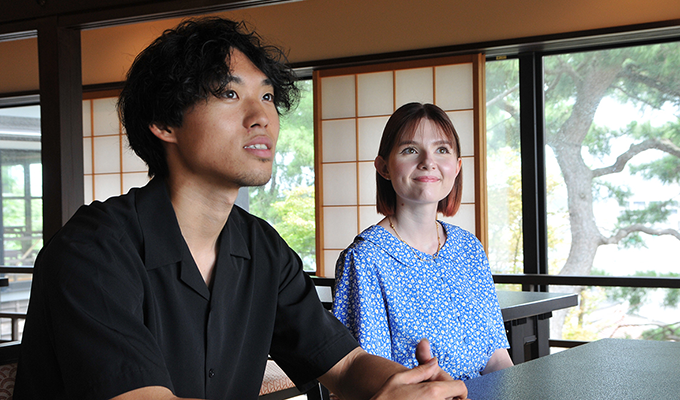
Amandine first encountered Japanese shortly after she was born. She describes the influence that her brother, who is significantly older, had in exposing her to the language, as he would watch Japanese anime and engage with Japanese culture, allowing Japanese to naturally reach her ears.
"Even when I was a baby, I was in an environment surrounded by the Japanese language and Japanese culture. Whenever I was with my brother, I always heard Japanese, and it felt more like a second mother tongue to me than a foreign language. When I was in elementary school, I still thought of hiragana and katakana as pictures rather than letters, but started drawing and remembering them while looking at my brother's Japanese textbooks. That's how we used to play: I would copy characters, for instance ま (the hiragana character 'ma'), and my brother would test me."
The way Amandine's eyes light up as she tells us this in fluent Japanese reveals that she has been full of curiosity since childhood. From the age of 11, she began to study Japanese seriously.
"By the time I was in junior high school, I knew a fair number of words, but grammar and the nuances of meaning still eluded me. I wanted to know more, and that's when I decided to take my Japanese studies further. At the time, my father basically gave me the choice of learning a musical instrument or studying Japanese. I had wanted to play the piano, but thinking about my future, I chose Japanese. Thus, during the seven years from junior high school until I went to university, I took weekly Japanese lessons at a location that was an hour away by car."
Encountering the Issue of Keigo (Polite, Respectful Japanese) on Exchange in Japan
Amandine spent a month studying abroad in Japan at the age of 15, and again when she was 17. She then went on a year-long exchange as a university student, hoping to learn the language in even greater depth. At her exchange university, she was already proficient enough in the language to surprise her classmates with her native-like pronunciation, but it was here that she encountered a greater barrier: keigo, the honorific form of Japanese that is peculiar to the culture. In France, Amandine had focused on casual conversation and had little knowledge of keigo.
"My Japanese teacher in France wouldn't teach me keigo because they said it is not used in everyday conversation. So coming to Japan I found myself thrown into situations where I suddenly had to use keigo when speaking with university lecturers and senior students, and even at my part-time job, and I panicked. Of course, some people don't mind the use of casual language, but others dislike it, especially among the senior students. If you don't use keigo properly, it can sound rude or make the other person feel uncomfortable, so I put an immense amount of effort into studying it."
In our conversation, Amandine recalled how keigo was an important skill for her to build relationships in Japan, and how it had been a big challenge for her. After her exchange year, Amandine made the decision to live in Japan and found a job at a cell phone retail company.
Moved by the "Hospitality" Embedded in the Japanese Language
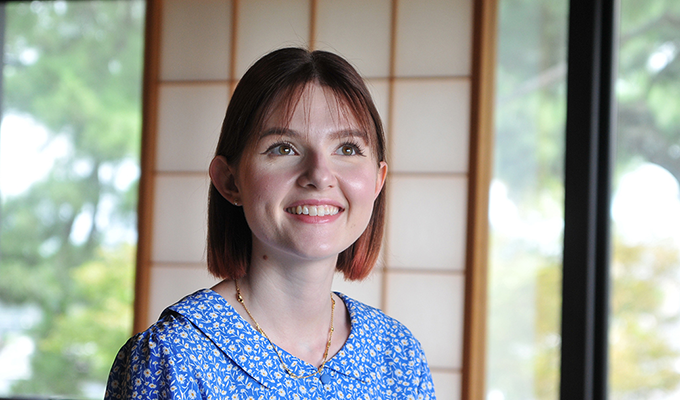
After joining the company, Amandine was assigned to dealing with customers over the phone.
"Because I didn't have much of an accent when I spoke Japanese, many people mistook me for a Japanese person when I answered the phone. I suppose it was only natural, because you can't see the person you are talking to over the phone, but I was really nervous about making mistakes, which would reflect poorly on the store. For example, sometimes a customer would tell me the kanji characters used to write their surname, and I wouldn't know those kanji. So, for about the first three months the senior colleagues mentored me, pointing out things like, 'The kanji they said is this one,' 'Try it this way next time,' 'This is incorrect,' and, 'You can't do that.' This allowed me to thoroughly practice how to handle phone calls, and when I look back on it now, it was really good training."
It was a difficult but insightful experience for Amandine. She was impressed by the "hospitality" embedded in the Japanese language. The Japanese custom of adding a few considerate words so as not to hurt the feelings of the other party, whether in a business setting or in everyday life, was an entirely new experience for her.
"Polite speech in French and English lacks the same concept of humility that exists in Japanese, where everyone speaks on equal terms. Japanese people choose what they say based on how it will make the other person feel. In a business email, for example, if you respond frankly with, 'We cannot accept this contract,' it comes across as cold. However, if you add something polite like, 'I'm afraid...' or, 'It might be difficult...' it shows consideration for the other person. I was deeply impressed by these kinds of verbal exchanges that showed the consideration and hospitality of Japanese people."
Nowadays, it seems that Amandine has adopted a completely Japanese attitude when communicating. Even when sending an email in French, she now feels that getting straight to the point and not adding any pleasantries sounds too curt, and frets over whether she should add an emoji, and whether her tone sounds angry.
Becoming a YouTuber Who Conveys the Charms of Japanese Culture from Her Part of Japan
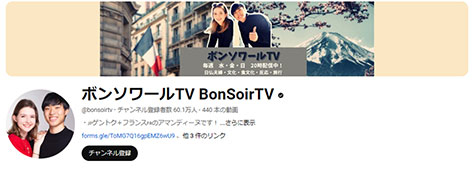
Around the time that Amandine had become accustomed to living while using Japanese, a significant turning point occurred in her life. She married Gentoku, whom she had been dating since university. It was husband Gentoku's suggestion to make YouTube videos as a married couple.
Gentoku recounts, "When we were both working different jobs, we had fewer opportunities to spend time together and with our families. I wondered if there was any job we could do together, and I suggested that we could easily make videos for YouTube, something that I had been interested in doing for some time. Amandine was initially reluctant, saying that being a YouTuber is not a job that will last forever and that she was not confident speaking in public. However, her thoughts for her family back in France greatly influenced her decision to become a YouTuber."
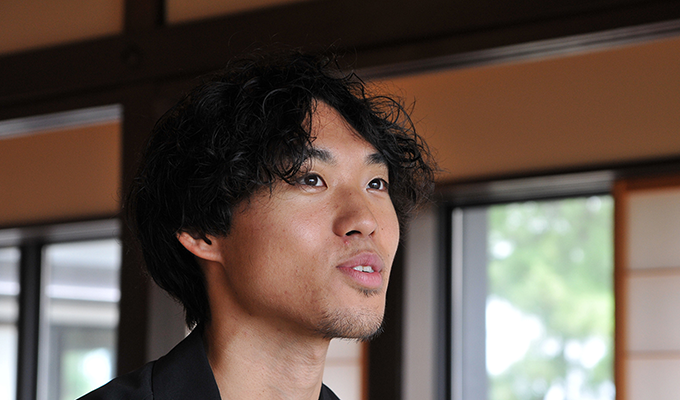
Amandine adds, "Gentoku suggesting YouTube coincided with my father in France falling ill. I could change jobs at any time, but I only have one father. I wanted to see my dear family as much as possible, but it was not easy to take time off work. With YouTube, I'd be able to spend more time with Gentoku, and I could visit my family in France to film. Creating those opportunities was the main reason why I decided to start making videos for YouTube."
So they took the plunge in 2021 and the BonSoirTV YouTube channel was born. This was Amandine and Gentoku's first foray into becoming international married YouTubers.
At the same time as starting BonSoirTV, they relocated to Gentoku's hometown of Sakata in Yamagata Prefecture and started creating content focused on local life and culture. Despite a variety of twists and turns along the way, Amandine has established a style in which she conveys the charms of Japanese culture, explains the differences with French culture, and more, all in Japanese, and has planned and filmed videos on many different topics. Then, in March 2022, Amandine and Gentoku were appointed as Sakata Kitamae Ambassadors by the city of Sakata and became all the more dedicated in their mission to promote the charm of Japanese culture, focusing mainly on Sakata.
"For many reasons, Japan has been becoming an increasingly trendy tourist destination. I thought it was a shame, however, that everybody tends to visit the same sights, eat in restaurants without knowing a word of Japanese, and end their trip without ever really understanding the culture. When I studied abroad in Japan during high school, I spent most of my time with my host family, got to visit various places with local people, and asked them things like, 'What is this?' and 'How do you make this dish?' By always asking lots of questions, I was able to deepen my understanding of Japanese culture, and I believe that is 10 times more enjoyable than simply visiting tourist spots and returning home. You really feel immersed in authentic Japanese culture, and that's why we create videos on our YouTube channel that showcase places off the beaten track and local eateries to show viewers the real Japan as much as possible. You're much more likely to experience authentic Japanese culture in a local place than a tourist spot. Local places leave a more lasting impression, as staff will warmly welcome customers and go to great lengths to explain the dishes. On social media, there is a tendency to only focus on the sightseeing spots that make the best photos, but there is so much more wonderful local culture that is not well-known, and I want to share this with as many people as possible."
The Bridge Project That is Helping People to Realize Their Dreams Through Experiences in Japan

A project that BonSoirTV is putting special effort into provides an in-depth look at a person's visit to Japan. This project - in which the person is enthusiastic about Japan and is helped to achieve their dream while having a variety of experiences - was created by Amandine and Gentoku from their desire for people to experience the real Japan and realize their dreams there.
"Ever since I was a child, it was always my dream to live in Japan, and while I have now realized that dream, I didn't get here all by myself. I'm only where I am today thanks to my supportive family, my Japanese teacher, my host families, Gentoku and his family, and many others. I started this project partly because I wanted to return the support I received by giving back to everybody. I want to lend a hand to people who have something they want to do or a dream they want to achieve in Japan, but don't know who to ask or how to go about it, and help them take the first step in realizing their dream. It would be ideal if they could use something gained from our time here together in their lives."
As of August 2024, Amandine has invited five groups of French people, including her mother, to Japan and filmed them experiencing various aspects of Japanese culture, including having a go at making things. This unique project offers experiences that cannot be found anywhere else, contributing to its popularity and earning BonSoirTV even more attention from viewers.
Creating Videos that Delight Everyone, Not Just for One's Own Sake
"Whether it was a woman who had been bullied in France, a man who had regrets, or a woman who wanted to make a leather school bag in Japan, everyone seemed to gain something. The experience also positively impacted their future lives, with them saying things like, 'Coming to Japan gave me confidence,' 'I was able to let go of my regrets, and am now able to work towards my next stage in life,' and 'It was the first step towards achieving my dream.' Our videos are not made for our personal satisfaction, but with the hope that they delight both those who take part in them and the viewers who watch them, and that they are emboldened by them."
In the planning and production of BonSoirTV, Amandine and Gentoku always consider the feelings of the locals in Sakata, as well as those who participate in their projects and their viewers. Perhaps this is why they continue to receive the support of over 650,000 viewers.
Transcending Different Languages and Cultures to Deliver Real, Unfiltered Emotions

Videos filmed for BonsoirTV naturally require editing, and one of the most important steps in this process is adding subtitles that will resonate with viewers. As many of their recent videos are in French, the husband-and-wife team work together on the subtitles: Amandine first translating the French into Japanese, then Gentoku condensing the sentences to an appropriate length for subtitles. Gentoku explains his stance on creating translated subtitles, which often take over a week of trial-and-error for a single video.
"As French contains many nuances, it's never enough to simply provide a direct translation. It's also incredibly challenging to condense the information into short Japanese sentences that can be read at a glance and fit the pacing of the video. Amandine often tells me that the subtitles are lacking in emotion. When I'm editing, I'm constantly thinking about how to convey the story's essence with short sentences that are imbued with feeling and retain the emotional sensitivity. In the past, I have actually hired people who specialize in subtitling, but regardless of their language ability - whether a French person proficient in Japanese or a Japanese person fluent in French - none of them performed better than Amandine."
In creating videos with subtitles and sound effects that truly resonate with viewers, what Amandine and Gentoku pay the closest attention to is its "naturalness." This is because if the subtitles and sound effects become too dramatic or excessive, it will end up creating an impression similar to the manufactured production of a TV show.
"We strive to present our footage naturally, and the genuine feelings of guests as is: raw and unfiltered. We want viewers to feel the authentic and natural emotions, which is also why we use an unedited screenshot from the video for the thumbnail. We never want to re-shoot anything as a manufactured scene, and we strive to ensure that the emotions felt by the French guests are not fake or exaggerated, and are presented as is."
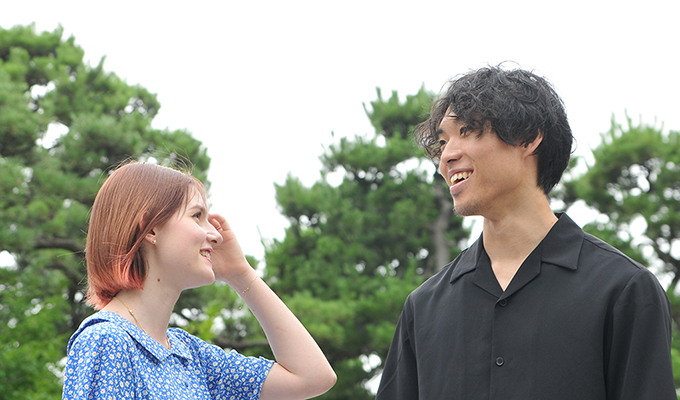
Recently, BonSoirTV's audience includes not only Japanese people, but also an increasing number of international couples living in France.
Amandine and Gentoku explain, "For example, there might be a married couple where the wife is Japanese and the husband is French, and they'll show our videos to their children so that they can learn about the differences in language and culture. I think mixed-race children are sometimes unsure about their identity - whether they are French or Japanese - but we've received messages from people who said that watching BonSoirTV made them realize that it doesn't matter, and either is fine. We hope that, by watching our videos, people will be able to overcome any cultural differences or prejudices that they have, and recognize that we're all human, interacting with one another on a personal level."
International Exchanges Began Organically at French and Japanese Elementary Schools
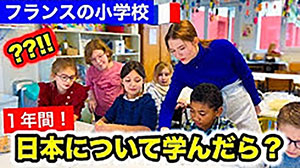
BonSoirTV's impact even goes beyond YouTube, and international exchanges have sprung up organically at elementary schools in France and Japan as a result of BonSoirTV's project to provide an in-depth look at someone's visit to Japan.
"One of the guests who appeared in our videos is an elementary school teacher, and upon returning to France he contacted us about working on a video project together, titled 'Introducing Japanese Culture.' We introduced his students to various aspects of Japanese culture, such as making onigiri and folding origami, and it proved to be immensely popular with the children. At the end of the video, the principal expressed her desire to arrange an exchange with a Japanese elementary school. A school in Japan responded, and they began to collaborate. The Japanese school sent the mascots of the 2020 Tokyo Olympics, some Japanese sweets, and other things, and the French school reciprocated by sending the mascots of the 2024 Paris Olympics. Now they treat the mascots as 'exchange students,' including them in activities where you can learn about different cultures, such as school trips. The children write about these experiences in a diary that is exchanged monthly, forming a large-scale diary exchange project. The children really look forward to reading what the others have written. I think it's a great idea, and we hope that our activities will serve as a bridge between Japan and France and nurture the beginnings of new international exchanges that will deepen the understanding of different cultures among the children of the two nations."
Amandine's Goal is to Go Beyond Her Current Field and Out into the World

While continuing the project supporting foreigners in realizing specific dreams in Japan, Amandine reveals another personal dream that she has long held dear to her heart: to break into the new field of traveling the world. This dream as well would not just be about enjoying the sights, but also interacting closely with the local people and culture in order to convey the real charm to her viewers.
Talking about the future, Gentoku says, "Whether it's taking an in-depth look at someone's visit to Japan or travelling the world, I think what drives Amandine is her genuine curiosity and anticipation of new discoveries and inspiring experiences. This common thread runs through everything we do now and continues to shape our future plans for BonSoirTV."
Amandine and Gentoku's videos do not simply depict experiences, they are also stories that resonate emotionally, not only with their guests and viewers, but with the creators themselves, each one of them imbued with narrative drama. In addition to the spoken content, they take great care to show the emotions of people experiencing different cultures, creating a connection between the two. Behind this is a profound understanding and love for the differing cultures of both Japan and France, and a sincere desire to create something that everyone involved can enjoy. Amandine and Gentoku will surely continue to create new stories full of discovery and emotion as ambassadors that connect France, Japan, and now, the world.
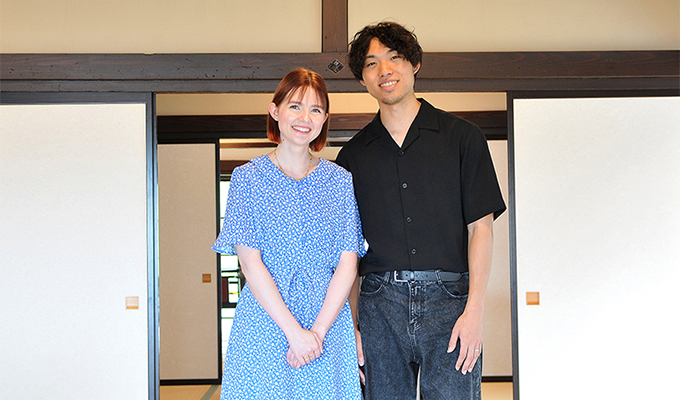
[Wochi Kochi editorial department: Editor's afterword]
Throughout the interview, I was impressed by Amandine and Gentoku's passion and sincerity. The Japan seen through the eyes of Amandine as a French person may contain something special that we Japanese people tend to overlook in our daily lives. I sensed a new approach to international exchange that is characteristic of current times, where information sharing and communication through social media have become widespread. The way the couple naturally engages with this new form of international exchange also seems to signal the start of a new era. I will continue to keep my eye on the activities of BonSoirTV, as they spread their unique perspective on Japan to a wider audience.
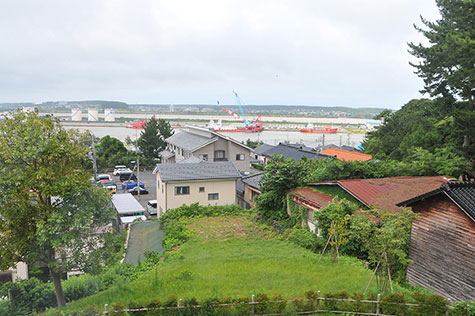
YouTube channel: BonSoirTV
BonSoirTV is the YouTube channel of Amandine (French) and Gentoku (Japanese), an international married couple living in Sakata, Yamagata Prefecture. As of September 2024, they have 650,000 subscribers. Videos on the channel introduce "the charms of Japan from a foreigner's perspective," showcasing things that might be commonplace for Japanese people but wonderful from a foreigner's point of view. Content on the charms of Japanese culture and the differences between Japanese and French cultures is featured in several categories of video, such as travel vlogs, "My French mother's Japanese travel diary," and a project that provides an in-depth look at a person's visit to Japan.
Thanks to Hiyori Bakery & Café at Hiroriyama Obatarou for allowing their premises to be used as the location for the photoshoot
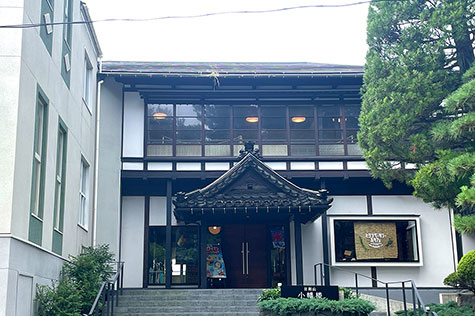
Keywords
Back Issues
- 2024.10.25 My Life in Japan, Li…
- 2024.5.24 The 50th Japan Found…
- 2024.5.24 The 50th Japan Found…
- 2023.12. 7 Movie Theaters aroun…
- 2023.6.16 The 49th Japan Found…
- 2023.4.24 The 49th Japan Found…
- 2022.12.27 Living Together with…
- 2022.12.27 Living Together with…
- 2022.8.12 Inner Diversity <…
- 2022.3.31 The 48th Japan Found…

